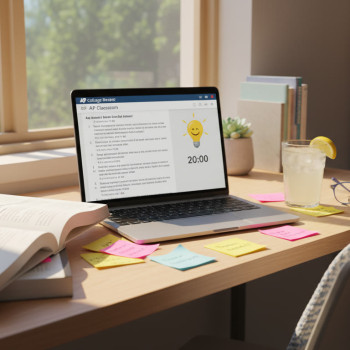Why weekend-only SAT prep can work (yes, really)
If you’re juggling school, activities, jobs, or just regular life, the idea of an SAT study marathon every night feels unrealistic. Good news: you don’t need to grind during weekdays to make real progress. With a thoughtful, focused weekend routine, you can improve accuracy, build stamina, and learn the right strategies — all while keeping your weekdays free. The key is quality over quantity.
What weekend study gives you that weekday study often doesn’t
- Long, uninterrupted practice time to simulate test conditions.
- Space to reflect and review — the only way mistakes turn into lessons.
- Fewer distractions and a better chance to use active study techniques (explain aloud, teach-back, written summaries).
- Opportunity to schedule targeted 1-on-1 help when it matters most.
Start with the right mindset: consistency beats cramming
Before you write a single practice question, decide what you want to achieve and why. A clear goal — whether it’s a target score, getting a scholarship, or simply doing your best — helps you make choices about how to spend limited time. Weekend plans excel when they’re consistent: three focused hours every Saturday plus two on Sunday will beat 10 frantic hours one weekend followed by nothing for a month.
Set an achievable, measurable target
- Pick a target score range (e.g., increase by 40–80 points) rather than a magical number overnight.
- Plan checkpoints: diagnostic test, mid-point practice test, final full-length test.
- Adjust your target as you see real progress — that’s part of smart planning.
The weekend study framework: what a typical weekend looks like
The following framework assumes two focused sessions: a longer session (3–4 hours) and a shorter session (1.5–2 hours). This is scalable: if you have only one full day free, combine elements into a single longer block with breaks. If you have more time, expand practice and targeted reviews.
Saturday — Deep practice and diagnostic work (3–4 hours)
- Warm-up (10–15 minutes): light review of formulas, grammar rules, or a few quick math problems to get warmed up.
- Timed section practice (60–90 minutes): simulate one full Reading & Writing or Math section under test conditions using a digital practice tool.
- Break (10–15 minutes): step away, hydrate, stretch.
- Targeted review (60–75 minutes): go through every missed question. Don’t stop at the right answer — write out why the other choices were wrong and what rule or thought process you missed.
- Strategy work (20–30 minutes): practice time management strategies (pass and come back, marking, mental math shortcuts) or reading techniques like passage mapping.
Sunday — Reinforcement and skills-building (1.5–2 hours)
- Quick warm-up (10 minutes): one short reading passage or five math problems.
- Skill block (45–60 minutes): focus on one weak area (e.g., algebraic manipulation, evidence-based reading, sentence structure). Use active practice: explain concepts aloud or teach a friend.
- Micro practice (30–40 minutes): do a 20–30 question mixed drill (untimed or lightly timed) to build accuracy and speed.
- Plan next weekend (10–15 minutes): note top 3 priorities to attack next weekend based on your review.
How to use official digital practice to replicate test conditions
Digital practice is the closest thing to the real test — it helps you adapt to the interface, timing, and tools you’ll use on test day. When you practice on the official Bluebook-style app or fully timed digital practice tests, you build familiarity that reduces test-day anxiety.
Tips for digital practice sessions
- Always practice at least one full section under timed conditions before doing targeted review.
- Treat the digital tools seriously: practice with the on-screen calculator, passage highlighting, and the navigation features you’ll use during the real test.
- After each digital session, export or save your score and question-by-question feedback if available — tracking errors over time reveals patterns.
What to prioritize when you only have weekends
When study time is scarce, every minute should buy you return. Here are the high-impact areas that weekend study should prioritize.
1) Practice tests and review — the backbone of progress
Full-length practice tests force you to manage time and attention. But the magic happens in the review. When you analyze mistakes deeply (not just mark them wrong), you transform errors into learning.
2) Targeted skill practice — fix weaknesses that cost points
- Math: algebra fundamentals, equation manipulation, and data interpretation are the most fertile ground for points.
- Reading: practice evidence-based question types — find the line in the passage that proves the answer and summarize it in one sentence.
- Writing & Language: focus on concision, sentence structure, and punctuation rules you miss most often.
3) Timing and pacing drills
Knowing when to move on is as important as knowing how to solve a problem. Use drills where you must decide in 60–90 seconds whether to keep working or mark and move on. Over time, your internal clock becomes a test asset rather than a source of stress.
Sample 12-week weekend plan (condensed and focused)
This condensed plan assumes you’re starting modestly and can devote focused weekend time. Adjust the pace based on your initial diagnostic and goals.
| Weeks | Weekend Focus | Key Activity | Expected Outcome |
|---|---|---|---|
| 1–2 | Baseline & major weaknesses | Full diagnostic test + deep review | Clear map of top 3 weaknesses |
| 3–5 | Skill blocks | Targeted practice on weakest areas; one timed section each weekend | Noticeable accuracy gains in prioritized areas |
| 6–8 | Strategy & pacing | Mixed timed sections; pacing drills; practice under simulated conditions | Improved time management and fewer skipped questions |
| 9–10 | Full practice tests | One full digital practice test each weekend + targeted review | Stamina and score projection; fine tuning |
| 11–12 | Polish & confidence | Micro-practice, error logs, and light practice tests; rest before test day | Peak readiness and calm mindset |
How to measure progress
Track sectional scores, timing, and the types of mistakes you make. Create a simple error log: date, question type, root cause (concept, careless error, timing), and corrective step. Over weeks, you should see fewer repeats in the same root cause categories.
Active review techniques that turn mistakes into wins
Mindless answer checking is a waste of time. Active review turns 90 minutes of practice into lasting gain.
Four review steps for every missed question
- Rewrite the question in your own words to ensure you understood it.
- Explain (out loud or in writing) why the correct answer fits and why each wrong choice fails.
- Pinpoint the exact skill gap (e.g., factoring, main idea inference, comma rules) and write a one-line rule you can apply next time.
- Create a mini-drill: 3–5 similar problems to do later that week or next weekend.
Smart time management: the art of triage on test day
Weekend practice gives you a great environment to practice triage — deciding which questions to attack and which to skip. Adopt a simple marker system when you practice (e.g., green for sure, yellow for revisit, red for skip) so you build muscle memory for those decisions.
Rules for triage
- On first pass, answer any question you can solve in under 90 seconds.
- Mark tougher items to revisit in your second pass; don’t let one question eat 10 minutes.
- Reserve a final 10–12 minutes to fill in guessed answers and re-check flagged items if time remains.
How to keep motivation high across months of weekend study
Consistency can be a relationship — with the test, with yourself, and with your plan. Gamify progress, celebrate small wins, and use social accountability to stay on track.
Practical motivators
- Buddy up with a friend for occasional study sessions or score check-ins.
- Reward streaks: an outing or treat after three productive weekends.
- Use a visible progress tracker (calendar sticker, spreadsheet, or a simple whiteboard).
When to bring in personalized help (and what to expect)
Weekend study is powerful, but if you’re plateauing or need tailored strategies, individualized tutoring accelerates progress. Personalized tutors can identify subtle patterns your practice tests hide, build tailored study plans, and deliver targeted drills that save you time.
How personalized tutoring fits into a weekend plan
- Book 1-on-1 sessions around your weekend practice: a short tutoring session mid-week (if possible) to preview weekend targets, or a review session after your big practice test.
- Ask your tutor for an error-focused mini-drill set you can complete during your next weekend session.
- Leverage AI-driven insights if available to track progress and refine practice — but combine them with human feedback for strategy and motivation.
For students who want structure and fast gains, Sparkl’s personalized tutoring blends expert tutors, 1-on-1 guidance, tailored study plans, and AI-driven insights — which can be slotted naturally into a weekend-first schedule to maximize efficiency and confidence.
Common weekend study pitfalls and how to avoid them
- Doing lots of untimed practice without assessing pacing. Fix: always include timed sections occasionally.
- Focusing on new problems without reviewing past mistakes. Fix: dedicate at least 35–40% of study time to review.
- Thinking practice tests are for scores only. Fix: use them as diagnostic tools — the score is a side effect of learning.
- Skipping rest and recovery. Fix: schedule rest days and shorter weekends when burned out.
Real-world examples: how students made it work
Case A: Sam had two months and could only study on weekends. He started with a diagnostic, then focused Saturday on a full Reading & Writing section and Sunday on targeted algebra and pacing drills. After 8 weekends he improved correctness in algebra from 60% to 82% and gained 70 points overall.
Case B: Lina juggled a job and used a tutor to maximize her weekend hours. Her tutor gave mini-drills tailored to her common error types and reviewed her practice test errors in weekly 30-minute video calls. The 1-on-1 guidance helped her cut careless errors by half and build test-day confidence.
Test-day checklist for weekend-focused students
- Two nights before: Light review of core rules and formulas, but not heavy studying — preserve energy.
- Night before: Get a full night’s sleep and prepare everything you need (ID, device check, charger, quiet place if testing remotely).
- Morning of: Eat a balanced breakfast, do a 10-minute warm-up (a few quick problems), and use breathing techniques to steady nerves.
- During the test: Use your triage system, keep an eye on pacing, and trust the strategies you practiced on weekends.
Final thoughts: weekend study is a smart strategy, not a compromise
Preparing for the SAT with only weekends is not a handicap — it’s a design constraint. When you treat each weekend session as a deliberate experiment (practice, review, refine), your study becomes efficient and resilient. Use official digital practice to stay realistic about the format, target your true weaknesses with active review, and consider periodic personalized tutoring to accelerate gains. The goal isn’t frantic coverage of everything — it’s steady, measurable improvement.
One small action to start this weekend
Take one full digital section under timed conditions and spend the remainder of your study block doing the four-step active review for every missed question. That single cycle repeated across weekends is the simplest, most reliable way to move your score upwards.
Need help shaping a weekend plan that fits your life?
If you want a tailored weekend plan — short, specific, and aligned to your diagnostic — consider scheduling a short consult with an expert tutor who can convert your practice test results into a high-impact weekend roadmap. With targeted 1-on-1 guidance, a few tailored drills, and AI-driven insights to track progress, you’ll maximize the time you already have.
Good luck — and remember: smart, consistent weekend work adds up. One focused weekend at a time, you can get test-day ready.















No Comments
Leave a comment Cancel